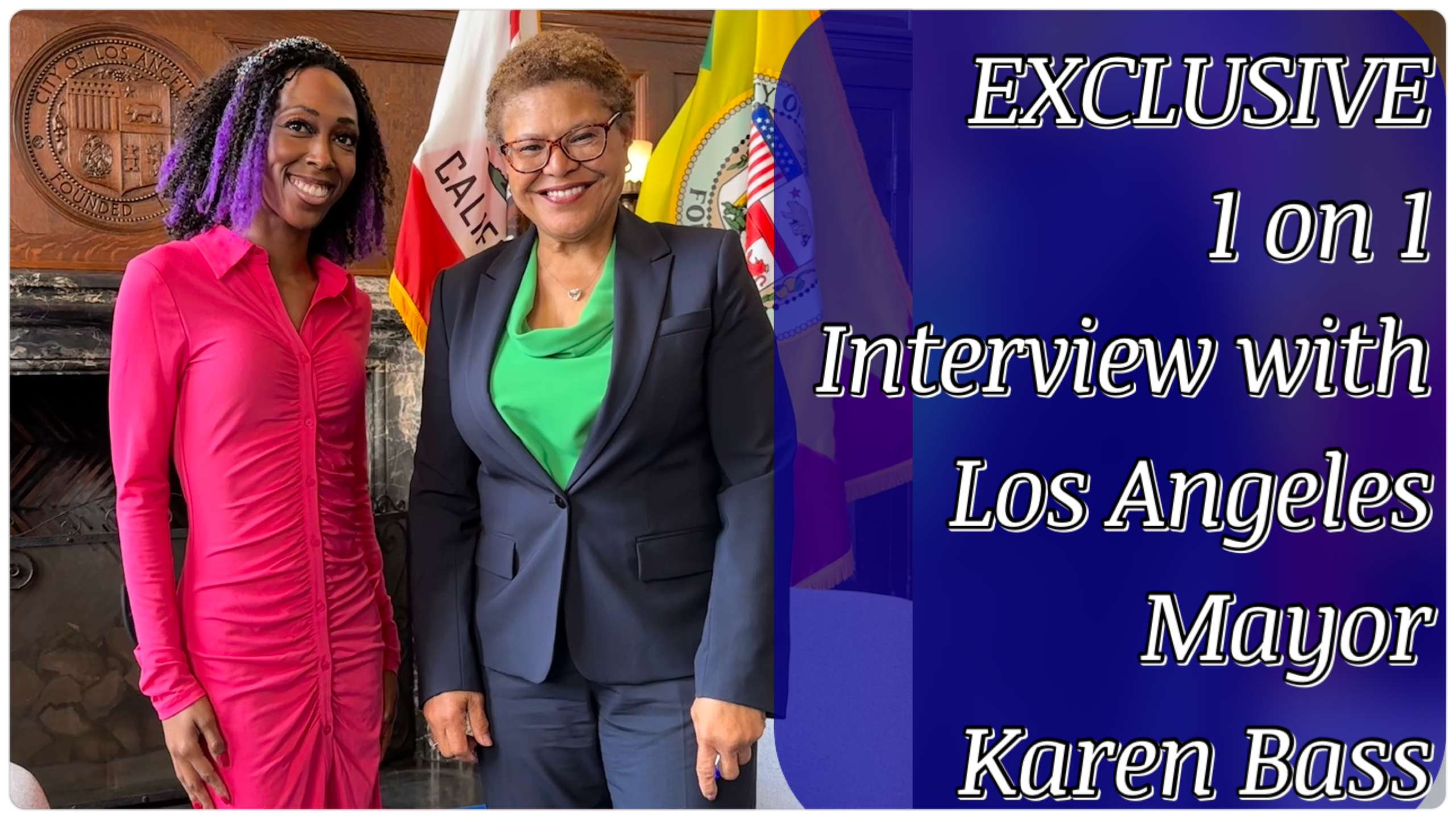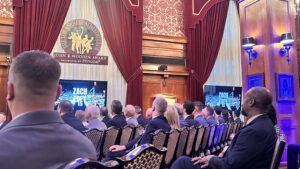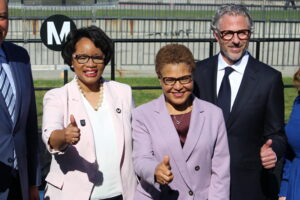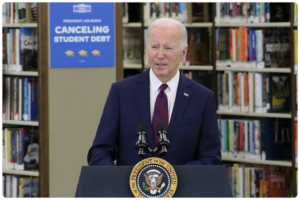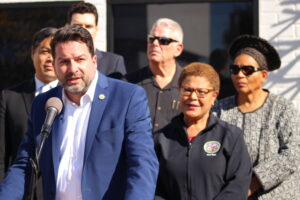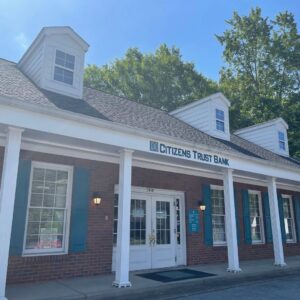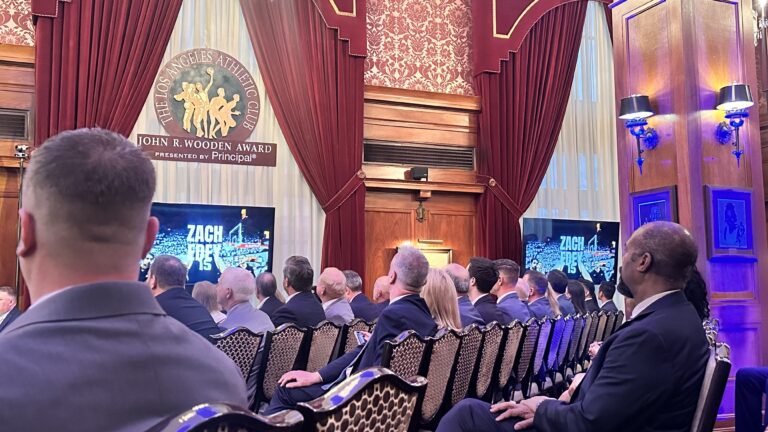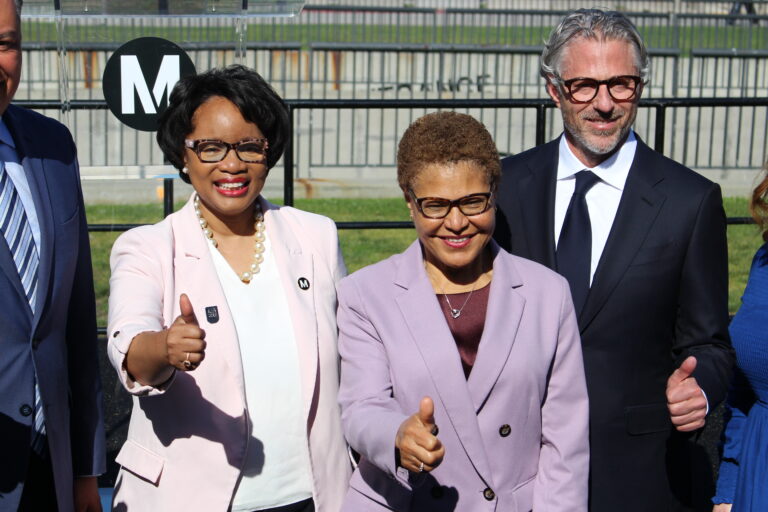Los Angeles Mayor Karen Bass hit the ground running on her first day in office by declaring a state of emergency against homelessness before she even stepped foot into City Hall and hasn’t stopped making major moves since. This sense of urgency ushered in a wave of change from her vision for a new LA.
Her first 100 days in office exemplified what it means to lead with compassion yet she strategically found ways to combat any bureaucracy that presented barriers to curing what she described as a “humanitarian crisis”.
Take into account her work as Physician Assistant, nurse and clinical instructor to understand her advocacy guaranteeing treatments for substance abuse and mental health while addressing homelessness. It takes a dedicated group to execute the operations and street medicine teams she has set into motion, but she has proven thus far, she is the best person to lead the charge instead of the usual band-aid solutions.
As she continues to deal with getting unhoused Angelenos into more permanent and supportive housing, the daily duties of managing the second most populous city in the nation presents its own set of challenges. Another key defining issue that concerns her is figuring out how to ensure other vulnerable groups and disadvantaged people don’t also fall into homelessness which she projects could have far greater impact. Even climate change and other environmental issues can add to the homeless rate especially in areas that have suffered from neglect and abandonment. These are the current threats to what should be a robust and thriving city.
It was just moments after the mayor joined the Honorable Curren Price within the City Council chambers to recognize Africa Day, that I had the honor and privilege to sit down with one of the most powerful women in the nation who a week prior passed her first City Budget of $13 billion for the fiscal year 2023-24 taking effect July 1. The budget was increased by 11% to include unprecedented funding in which $1.3 billion will go towards homelessness while directing $250 million for Inside Safe. The new, citywide, proactive housing-led strategy brings people inside from tents and encampments. $31 million will be spent for permanent housing transitions that will also provide 12 months of rental assistance.
As I was making my way into the Mayor’s office, Ambassador Diane Watson, former U.S. Representative who was succeeded by Mayor Bass was making her way out with adoring fans in line waiting for a photo opportunity. The pair have remained connected and demonstrate the lifelong commitment of a dedicated public servant.
My time with the mayor was direct and brief yet we were able to discuss a wide-range of topics starting with preventing homelessness, the 2028 Los Angeles Olympics and why she is showing early support for U.S. Representative Barbara Lee for the U.S. Senate-a seat that will soon be vacant upon the retirement of Senior U.S. Senator Dianne Feinstein. The next day, she would host U.S. Department of Health and Human Services Secretary Xavier Becerra which proves her time in Washington D.C. helped deepen partnerships to leverage federal resources to from the Biden-Harris administration. She does all this with a sunny disposition always smiling, always reassuring. Now that her budget has passed, you would think she would take some time to revel in the moment, but the hardest working woman in the city will then jet set off to Columbus, Ohio for the U.S. Conference of Mayors Annual Meeting, where she will meet with federal and local leaders to discuss pressing challenges that Los Angeles and communities across the country are facing.
LILA BROWN: Thank you so much for meeting with me and taking time out of your schedule. Congratulations on passing an historic City Budget and really bringing more attention to the humanitarian crisis of homelessness in the city. So, I want to know what’s next on your agenda for preventing homelessness? With the moratorium on renter’s protections. How do you make sure the next disadvantage group doesn’t fall into homelessness?
KAREN BASS: Thank you. Well, I’m very concerned about that. And so we are addressing that in two ways. First of all, the city council passed tenant protection, but I’m very worried that tenants won’t know about it. And so we have contracted with an outside firm to essentially get the information out there to the public using social media, print, radio, tv, whatever, to communicate to Angelenos that there are protections also, um, the Los Angeles Mayor’s Fund, which is a independent nonprofit that I inherited from Mayor Garcetti, we are focusing on expanding the outreach on a grassroots level.
So the firms will do it in a more traditional way. The grassroots organizations will do it, um, in an entirely different way where they’re reaching out directly to people. The other thing that they’re doing in the Mayor’s fund is they’re recruiting pro bono attorneys. And so that I believe is critically important because if we’re not careful for every person that we’re getting off the streets and inside safe and other ways that we’re getting people off the streets, we could have four or five more people falling into homelessness.
LB: How do you get the landlord’s, property owners, property managers to accept, um, some of the programs that you were saying, uh, such as the Section eight voucher?
KB: Well, that’s a different issue. That’s a different issue. Uh, what we were doing in terms of making sure that renters knew they had some protections, but in terms of communicating with, uh, landowners, that’s a program that we’re gonna begin in the next month or so. And that is an outreach campaign to Angelenos who own apartments around the country to please just accept one or two vouchers and that we will work with the, uh, landlords so that we send them a proper tenant.
And we also don’t abandon that tenant once they have looped into the housing. And so we’re hoping that this spirit of collective responsibility, they’re all angels need to step up, will, uh, be evident by additional land owners being willing to accept vouchers.
LB: When you were newly elected, you talked about a lot of the barriers, you call it self-inflicted. Yes. For some, that may feel more like targeted attacks because there was redlining, gentrification, just housing discrimination and segregation…
KB: Oh yeah. It wasn’t that I, I didn’t mean that at all. But no, no, no. What I mean is, is that, for example, to place people into housing, the federal government required Los Angeles and every other city to come up with a system to determine who gets housed. Unfortunately, the system that we came up with is so onerous that a lot of people who should be housed are not housed, which is why you can see housing being built in South LA and people from literally outside of Los Angeles City, maybe in some of the surrounding cities in the county actually getting the benefit of the housing.
LB: Should there be some legal remedy for housing segregation and housing discrimination?
KB: Well, I mean absolutely. If that is taking place. What I’m describing though, I think it’s something different. Uh, to me, housing discrimination is, I’m attempting to rent an apartment that’s widely advertised as being vacant, but the minute I show up, all of a sudden it’s filled. And if a white individual shows up, then the unit is still vacant. That’s a different type of thing than what I’m describing. I’m describing bureaucratic hurdles that were unnecessary.
That’s what was self-inflicted. So since we set up the bureaucracy, we have the power to set that bureaucracy aside and we have done that.
LB: Thanks, for clearing that up because you said some things and I wanted to get more clarification.
KB: No problem.
LB: President Biden has noted that housing discrimination has created barriers to the racial wealth gap.
KB: Absolutely.
LB: How do you get the larger Los Angeles business community to get involved with that? Because it seems like the root cause of this is economic exclusion. So how do we bring all that together?
KB: Those things have to be documented and people need to pursue legal remedies. And you have the Legal Aid Foundation and other legal services that can do that. We have to fight against that type of discrimination, just like employment discrimination.
LB: Well with Hollywood, there’s been issues with some of the talent casting, racial discrimination also below the line and behind the scenes. How do you get Hollywood on board with your agenda making L.A. more equitable?
KB: Really and truly, the way that I have been working with Hollywood is to make sure that there is diversity in the below-the-line, the crafts, graphs, grips, painters, the people that make molds…all of that be diversity in terms of who gets hired. Then also when we do things like offer tax credits, you know, that we expect diversity there in terms of the companies that are issued the credits.
LB: Los Angeles has a Reparation Advisory Commission now. How will your office be working with that department?
KB: That’s a very good question. Capri Maddox is the General Manager over that department and it’s something that I want to get involved in and find out exactly where they are with the process just like the state commission. So I haven’t had the opportunity to review those reports, but I certainly plan to.
LB: I just want to switch gears to the Olympics. A lot of planning is going on and we usually don’t hear about problems that stem from bribery and corruption until after the Games. How do you make sure that small businesses will be included with the planning?
KB: Thank you. I really appreciate that question. So, our Deputy Mayor for Business and Economic Development, Rachel Freeman, is leading the way in that effort. The two of us met with Casey Wasserman, who’s in charge of organizing LA 28, which is the Local Olympic Committee. We asked him if he would do a presentation right now for small and minority owned business. And the reason is because as I’ve talked to people in the community, they actually believe that the decisions have already been made and they’re already excluded and that’s just not the case. No decisions have been made, and I’m referring to small business contractors. The procurement process has not gotten underway. We want people to know ahead of time what specifically the games will be looking for so they can think about it and get their house in order. Now.
LB: All right. During the height of the pandemic, there were other cities enticing Angelenos to move their businesses and just leave the state altogether. How do you convince small business owners and entrepreneurs to keep their business in Los Angeles?
KB: Well, I think that the number one way to do that is to house the people that are unhoused, which is a quality of life issue. It’s an issue that is very troubling to local businesses because sometimes encampments are nearby or in front of their business. For people to feel safe and for small businesses to understand that the city doesn’t just support them and embrace them, the city wants to help them flourish. Through our deputy mayor, we’ve definitely been sounding that alarm to all of the various business organizations.
LB: That’s great and I just love the coalition that is happening with Dr. Shirley Webber and State Controller, Malia Cohen and it just seems like the “whole of government” approach is playing out nicely. Then you had the Ambassador [Susan] Rice and Secretary [Marcia] Fudge involvement as well. Can you talk a little bit more about that?
KB: The work I’ve done over the last four decades has always involved bringing people together regardless of ideology, geography, race, gender, whatever and focus on a specific problem. The problem I’m referring to, of course, is the problem of 47,000 Angelenos being unhoused. But what I wanted to bring to the table and I said this during the campaign, is because I served in the State House and on the federal side, that I could leverage those relationships. In the next couple of days; for example, the Secretary of Health and Human Services will becoming Xavier Becerra. That’s to talk about healthcare and especially substance abuse and mental health treatment for people who are unhoused. Building on relationships that I’ve built over many years and bringing those relationships to the table to help us with our most pressing problems is something that I’m focusing on a great deal. I’ve always had strong relationships at the city and the county level, even though I’ve never served in local office.
LB: You’ve shown early support for [U.S.] Representative Barbara Lee. What should voters know about her? Why should we choose her? You know, there’s an Angeleno with [U.S.] Representative Adam Schiff, [U.S. Representative] Katie Porter…
KB: I would say; first of all, the three candidates that are running for [U.S.] Senator are all incredibly talented and committed legislators. I could speak for each of them. Barbara Lee; however, is one of my closest friends. She’s been a mentor and advisor to me for many, many years. I first started working with her almost 30 years ago when she was in the state legislature. She helped us with problems that we were dealing with in South LA. Since I served in Congress, she has been there for me every step of the way. One of the things that people should know about her is that she’s one of the hardest working people on the hill and has had tremendous accomplishments in her years since being there. She’s internationally known for a number of reasons, one of which was she was on the forefront of the fight against AIDS. She was on the forefront of holding the Bush administration accountable and supplying AIDS medications on the continent of Africa. So, literally hundreds of thousands of people’s lives were saved because of her advocacy. That’s just a few of the reasons. After 240 plus years in our country, the fact that there is no African-American woman [serving] in the U.S Senate is quite a shame.
LB: Thank you so much for answering my questions and clearing things up. Have a great day.
<cross talk>
KB: You’re very welcome








